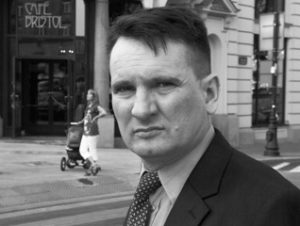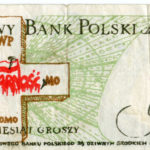
How to understand a Pole…
Opublikowano: 20 stycznia 2016
Freedom… Following Moses steps
It is hard to ignore Poland’s achievements of the last 26 years. They need to be treated with due respect. However, any overly enthusiastic assessments and diagnoses, or hyperoptimistic bouts of celebratory mood could do with more in-depth criticism. Sometimes it is good to put a fly in the ointment to make the whole picture more objective; it pays off to stand corrected. This is when the analysis becomes more thorough.
Moses dilemma
The weakness of the general Polish civic attitude can easily be explained sociologically. Sociology employs a concept of the Moses dilemma. The Hebrew leader guided his nation in their 40-year long pilgrimage from the Egyptain territory to the promised land, Kanaan, although the entire distance can be easily covered in two weeks. Why did the biblical journey last that long? There are many explanations, but the most appealing to
imagination is the one saying that the Old Testament story is supposed to provide guidance to once enslaved and now liberated populations.
Moses waited for the two generations of slaves to die out so that the people led into the promised land, to Kanaan, could be absolutely free, and that a free, truly civil society could be built with these free men as the foundations.
Moses himself didn’t live to see this moment, by then his older brother Aaron had become the leader of the Hebrew people who were brought to Kanaan already as independent nation. The mere fact of gaining freedom does not mean the people in question are free or that they are able to benefit from this freedom. There also needs to be a special inclination towards liberty, a free person’s instinct. In other words, freedom must exist in an objective dimension (of certain structures, institutions), but also in a subjective one (concerning attitudes, thinking methodologies), it must be present around a person, but also – within the person themselves.
There must be freedom in the surrounding environment, but the man needs to be free too. Paradoxically, the real freedom happens when we do not notice it. In Poland, freedom is very often compared to the air we breathe… That is a very correct analogy. A baby that is born in a hospital does not notice the air and usually does not think about it later, over the course of life, as it is something so obvious that one does not realise it. However, a person that wakes up from a coma after a bad accident, after being disconnected from a respirator, will need to learn to breathe again.
These analogies mean that there is a freedom acquired (gained, received, the one that we come to), as well
as an inherited one. People who had to fight or struggle for their freedom will have a different approach to freedom than those who were born into it. The former desire freedom, the latter – do not even notice it.
In the 25 years of political system changes, we, Polish people, have had to learn to be free. And learning to
be free is very difficult as it involves two fundamental duties: obligation and responsibility. That is why instances of a good citizen’s behaviours have been so difficult to come by in the country that Poland has become after 1989.
Only the generations that were born from the 90s onwards can be truly free. They do not have to learn about freedom, for them freedom is bred-in-the-bone.
But there have also been other diagnoses made to explain the lack or at least insufficient presence of active civic attitudes in the Polish society.
 „Cunning slaves”
„Cunning slaves”
A well-known writer and publicist, Rafał Ziemkiewicz, and if we follow his train of thoughts, partially also
professor Andrzej Zybertowicz from Nicolaus Copernicus University in Toruń, talk about so called post-collonial
society. The history has not been favourable for the Polish nationals, first condemning them to the life in
a partitioned country and then, after a short, 20-year long period of freedom, to existence in the communist regime and dependency on the Soviet Union supremacy.
Ziemkiewicz believes that this situation has led to the Poles developing so called post-collonial mentality, depriving them of pro-activeness, of sensitivity to public issues, and above all – of civic engagement. The publicist refers to these people as “cunning slaves”.
The definition of “cunning slaves” is further precised by professor Zybertowicz: these are people who understand the rules of the game, but without modifying them, without trying to change the established statusquo. Therefore, they are not creative. They do not strive for innovation.
Jan Sowa, a sociogist, psychologist, philosopher and culture expert, goes even deeper down the history. In his book
entitled “The king’s phantom body”(“Fantomowe ciało króla”), he associates a low proportion of active civic behaviours among the Poles and the inability to display proprietory approach towards their own country with the collapse of the hereditary monarchy and with the end of the era of throne succession – where the crown was passed down from father to son.
For as long as the throne was hereditary, the governing body, that is the king and his entourage (the court) had to take care of the country’s condition, its quality, to pass possible on to a successor (the son) the legacy
preserved as well as possible. Continuously individualized, personified authority works better in terms of efficiency and accountability.
Electoral monarchy transferred the power to the hands of the nobles. Efficiency and accountability became
dispersed. This very quickly led to a catasrophy for Poland. Political System The shortcomings in the Polish democracy and in the active civic life in its entirety can also be explained with two other types of analysis.
After the events of 1989, Poland was presented with a malfunctioning political system of an inherent structural incongruity; comptences of individual governing bodies were divided between them in an unclear and unnecessarily complex way; naturally, it has resulted in conflicts generated by the system and ultimately – in the utter disintegration.
Two elements in particular are badly failing in Poland: 1) the system of selecting elites and creating
establishment 2) as well as social control.
As a result of various elections, the Poles have chosen representatives that are avarage to say the least. Very often these elected people have no substantive or moral qualifications to hold any offices. Consequently, the elite does not consist of the best of the best, or of the society guides and public opinion leaders.
We lack an actual representative body, an institution built on an authentic link between people’s representatives and citizens, who are the ones endowing the former with their offices. The proportional electoral system introduced at the beginning of the 90s and then awkwardly modified at the beginning of the 21st century affects the quality of the country’s structures, as well as its social an political life. It impinges on the efficiency of holding power and on the accoutability for decisions made.
It does not inspire people to demonstrate civic involvement or democratic activity. During seven parliamentary elections in Poland post 1989, thus in democratic conditions, the attendance only on two occasions slightly exceeded 50% – in 1993 and in 2007.
The Poles have a low sense of self-agency and this is why they do not get involved in civic activity. There is a high level of social alienation.
Global consumptionism
Yet, we should analyse the defects of the Polish democracy also in a wider global context, as they inherently emerge from a more general global process. Jean Baudrillard, a French philosopher, sociologist and culture expert, rightly said that the world has entered an era of total consumptionism, which encompasses much broader aspects of reality rather than just purely economic processes, and virtually spans over the entire social life. It may result in mistaking immanent (natural) needs for constructed ones. Human activity is being instrumentalised for purchasing goods.
Michael Foucault, another eminent French philosopher, wrote that desire is created intentionally to manage, control and manipulate people. The modern reality brings about “the death of the human being”… This also applies to politics. People are the participants of the public sphere not as citizens, but as consumers.
These phenomena affect almost all world’s democracies, but even more so those which have not had time to stabilize yet: the young and inexperienced ones, such as Poland.
People focus more on interests rather than values. This is especially visible in Poland. Professor Piotr Gliński, a sociologist from Warsaw University, in the times when he was still serious about science, conducted a research concerning the level of active civic involvement in Poland. The study showed that engagement in non-governmental organisations is superficial in nature as it is motivated by a profit, whether it is a career progression, a financial remuneration or a subsidy to conduct business activity.
On the other hand, Polish people can demonstrate active civic attitudes by taking part in certain initiatives en masse, as a collective, especially if a critical situation demands that, when a threat occurs. They are world champions in this discipline. However, incidental behviours are not a measure of a country’s institutional quality, they have to be incorporated into a constant, stable and structurized process. They must be present in the everyday life, so obvious that they become unnoticeable.
 Roman Mańka
Roman Mańka
The author is a columnist, writer, and author of books in sociology and political studies intended for
the general public. He has previously written about mafia crime in the local media, and has also published in
nationwide media in Poland. A former deputy editor-in-chief of the Gazeta Finansowa weekly magazine and head of its national department, his materials have been published on the Onet.pl, Interia.pl, Inwestycje.
pl websites, in Gazeta Bankowa and Forbes.pl, Home&Market and Gentleman magazines. Currently, he conducts analyses in philosophy, sociology, sociology of science, sociology of politics and political science.






Dodaj komentarz